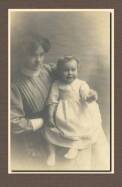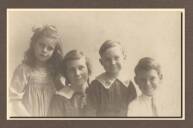 Gertie came as my nurse soon after we moved to Aytoun. She was an orphan, from All Saints� Home just up the road, and looked after me devotedly for years. Shena was jealous of the attention I got on at least one occasion: Mother made an appointment for the four of us to be photographed (aged about 10, 8, 4 and 2) and Shena had to come straight to the studio from St Cyprian's in school uniform - whereas I had been dressed in my very best and had had my hair curled by Gertie! A later photo to which Shena also objected was when she and I were dressed alike in pretty dresses made by Mother, but Shena thought the style was too young for her.
Gertie came as my nurse soon after we moved to Aytoun. She was an orphan, from All Saints� Home just up the road, and looked after me devotedly for years. Shena was jealous of the attention I got on at least one occasion: Mother made an appointment for the four of us to be photographed (aged about 10, 8, 4 and 2) and Shena had to come straight to the studio from St Cyprian's in school uniform - whereas I had been dressed in my very best and had had my hair curled by Gertie! A later photo to which Shena also objected was when she and I were dressed alike in pretty dresses made by Mother, but Shena thought the style was too young for her.
 Mother ran the house with a cook and a housemaid, and in engaging them she had always to insist on ability to answer the telephone and to take correct messages - so necessary in a doctor�s house. She seldom had perfectly trained domestics, and she battled to get them to reach her high standards. The housemaid wore a "working" uniform in the morning, a black frock and small apron in the afternoon. Annie was for many years our weekly charwoman, who cleaned the windows and the brass and polished the floors. Different Malay washerwomen came on two days a week and fixed up lines in the back garden for drying the washing. After many disasters in the ironing-room with burnt-out irons, scorched blanket and table, and frights over the possibility of fire, an electrician fixed a foot-stand and red light which automatically switched on when one stood in the right place and off when one moved away. Mother took me sometimes when she went to interview a washerwoman in her spotless home near Buitengracht Street.
Mother ran the house with a cook and a housemaid, and in engaging them she had always to insist on ability to answer the telephone and to take correct messages - so necessary in a doctor�s house. She seldom had perfectly trained domestics, and she battled to get them to reach her high standards. The housemaid wore a "working" uniform in the morning, a black frock and small apron in the afternoon. Annie was for many years our weekly charwoman, who cleaned the windows and the brass and polished the floors. Different Malay washerwomen came on two days a week and fixed up lines in the back garden for drying the washing. After many disasters in the ironing-room with burnt-out irons, scorched blanket and table, and frights over the possibility of fire, an electrician fixed a foot-stand and red light which automatically switched on when one stood in the right place and off when one moved away. Mother took me sometimes when she went to interview a washerwoman in her spotless home near Buitengracht Street.
Dad first had Henry as his coachman who then learned to drive a car. When Henry left, about 1916, Emma was our dear housemaid and she persuaded Dad to try her husband Jo Parsley as chauffeur, so Jo was taken on, taught to drive, and stayed with my parents for over 40 years. Jo also looked after the garden, with occasional help from casual gardeners. Dad�s second car, a two-seater Humber, had a dickey which could be removed and replaced with a �proper� back seat, and, using this facility of change, he had a flat back made on which were piled the blankets, bedding and other necessities for our moves to and from Glencairn.
A treat for us was to get a lift in the dickey seat when Dad started out on his rounds. From the garage, into Coronation Avenue, along Belle Ombre Road, and up Kloof Nek Road opposite Aytoun front gate, and around the corner into Camp Street where Jo stopped for us to jump off and scamper home. Only on one occasion did I ever try to save Dad�s precious time - I jumped off the back of the car just as it was rounding the corner slowly into Camp Street, and I learnt the hard lesson, by way of badly grazed hands and knees, NOT to jump off a moving vehicle backwards. I didn�t save Dad�s time either, as he had to take me into his consulting-room, and bathe, iodine and dress my wounds. Only minor medical matters, incidentally, did he ever deal with for his own family. Later we had an Overland and then a Maxwell car.
Some of Mother�s early housekeeping was done from the back door. The fish cart would come along, with the seller advertising his arrival with the easily recognised call which he made by blowing loudly on a dried seaweed horn. Our cook would go to the back gate and return with a stockfish, a Red Roman (which I thought very pretty), or perhaps a snoek or harders. Then there were fruit and vegetable sellers, and one heard the cries in Coronation Avenue of "Vaa-aa-aatlemoen" for watermelon and "painy-appels" for pineapples. On Saturday evenings the newsboys came round with their "Argy, City Late" calls - a signal for one of us (when we were a bit older) to be sent out to buy the weekend Argus to supplement the daily news which we got in each morning's Cape Times.